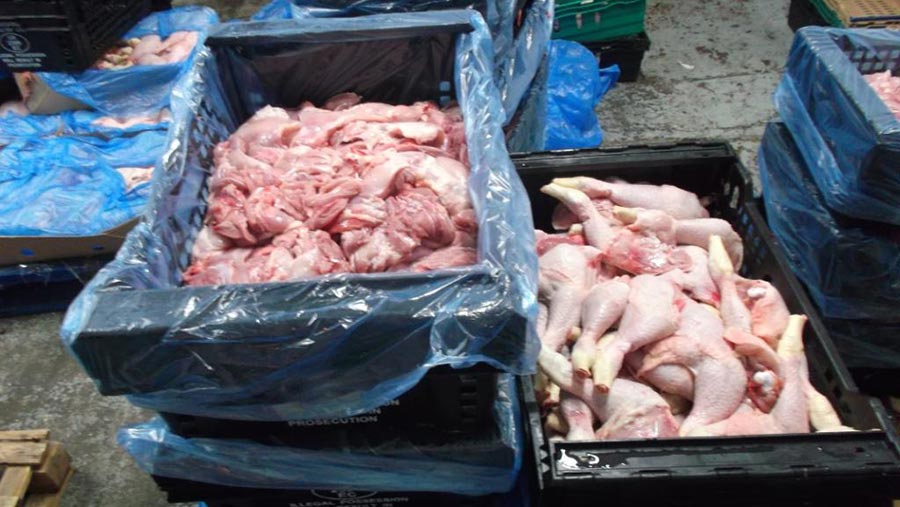Farmers may pay the price of 2 Sisters factory scandal
 Library image
Library image Farmers face paying the price of bad practice in the supply chain unless processors up their game when it comes to food safety, a leading expert has warned.
Chris Elliott, who led the investigation into the 2013 horsemeat scandal, spoke out after undercover footage appeared to show workers at a 2 Sisters chicken factory in West Bromwich changing the kill dates on crates of poultry, and mixing batches of old and new stock.
The scandal has implications for farmers beyond the poultry sector because much of 2 Sisters’ chicken is sold under the Red Tractor logo – the farm assurance scheme and quality marque that appears on a range of other British farm produce.
See also: 2 Sisters accused of manipulating use-by dates
Prof Elliott said: “Farmers are jumping through as many hoops as they possibly can – and if they put a foot out of place, they get heavily penalised or suspended. Work on farms is being done to a very high standard – and processing has to go in exactly the same direction.”
Most farmers and many good companies had fantastic food hygiene and high food safety standards, Prof Elliott told Farmers Weekly. But the risk was that they could pay the penalty of other firms’ bad practice through no fault of their own.
He added: “The risk is they get tarred with the same brush. What happens is people stop eating chicken. It starts to lose the power of what that symbol is – it just becomes another logo on another package. It will lose its value and its credibility.”
Prof Elliot’s comments echoed those of Manchester University’s European food crime research group, which said the latest footage – revealed in an undercover investigation by the Guardian newspaper and ITV – was the latest in a long line of such incidents in the food supply chain.
Previous research by the group had concluded that “the structure of, and operating cultures within, the food market are such that unethical practices are embedded in routine, daily food processing, production and distribution systems and procedures”.
Isolated incidents
The comments contrast with those made by 2 Sisters Food Group, supported by the Food Standards Agency and the British Poultry Council, which insist that the footage is far from representative of factory procedures.
2 Sisters said it was “shocked and distressed” by the allegations and footage – which also seemed to show employees picking chicken up off the floor and putting it back on the conveyor belts.
“Our internal investigation has shown some isolated instances of non-compliance with our own quality management systems,” said a spokesman. “We have therefore decided to temporarily suspend operations at the site to allow us the time to retrain all colleagues in all food safety and quality management systems.”
A number of leading supermarkets immediately cancelled orders from the factory in question, including Tesco, Sainsbury’s, the Co-op, Marks & Spencer, Lidl and Aldi.
A 2 Sisters spokesman insisted that there was enough spare capacity at the company’s other sites to ensure the supply of chicken to retailers could continue unabated. The company has also revealed that the incident is costing it up to £500,000 a week.
Dismay
NFU poultry board chairman Duncan Priestner expressed his dismay. “As farmers we produce food with integrity and we expect this to extend right through the supply chain to the supermarket shelves,” he said.
“British farms produce food to some of the highest standards in the world and it’s absolutely vital that these are continued beyond the farm gate. I hope the public will continue to back British farming.”
Quality assurance body Red Tractor has also suspended the 2 Sisters West Bromwich site from its scheme, pending the outcome of its own independent inquiries.
About 2 Sisters
2 Sisters Food Group is the UK’s leading supplier of poultrymeat, processing some 6 million birds a week, equivalent to about a third of total UK production.
The company’s largest site is at Scunthorpe, Lincolnshire, which processes about 2.4 million birds a week, followed by Willand, Devon, and Flixton, Norfolk, with about 1 million birds a week each.
The West Bromwich site, which opened in 2005 with more than £40m-worth of investment, is a cutting/packing plant, and processes the specialist Oakham range for Marks & Spencer.
2 Sisters was last implicated in a series of hygiene breaches – including chicken being picked up off the floor and returned to the production line – following Guardian investigations at the Llangefni and Scunthorpe plants in 2014. An FSA investigation then concluded that the company had breached regulations, but corrective action had been taken.
